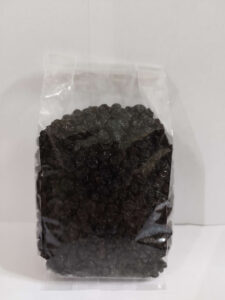Corinthian raisin: The black gold on our plate
“Black gold”… that’s what they used to call it in Greece, not only because it was the number one export commodity, but also because the people of the time understood its beneficial properties and included it in their diet.

The history of black currants through the centuries
In the past, raisins were a staple of the diet of our ancestors, who believed that they contained magical and highly beneficial properties.
Historical sources indicate that raisins were first cultivated on a large scale in Zakynthos in the 16th century. Later, it was also produced in other Greek cities such as the Peloponnese and Corinth (where it is often called the Corinthian raisin). In the 19th century black raisins accounted for 90% of Greece’s exports to Europe.
It is no exaggeration what X. Zolotas, that raisins were to Greece ‘what coffee is to Brazil’.
The use of raisins was widespread in past centuries.
General Hannibal had stocked up on many tons before crossing the Alps with his troops. Christopher Columbus and his crew crossed the Atlantic chewing raisins. Even the ancient Greeks and Romans decorated their places of worship with raisins and gave them as prizes to the winners of sporting competitions.
Roman healers also recommended raisins as a cure for everything from food poisoning to old age. Finally, even the Emperor Augustus offered his guests black raisins at his feasts.
Beneficial Properties
The black currant is undoubtedly one of the most important Greek superfoods. Its beneficial properties have been proven through numerous clinical studies (studies done on humans and not on animals) and rightly place it high on the list of superfoods.
The black currant is rich in:
- Fructose where it is responsible for its sweet taste ,but which has a high glycemic index.
- Potassium and magnesium which help reduce fluid retention.
- Iron which helps in the treatment of iron deficiency anaemia.
- Antioxidant Vitamin C, which helps in the absorption of iron and has restorative properties in skin aging, due to the fact that it enhances the production of collagen and elastin.
- Polyphenols that lower cholesterol and reduce the risk of heart disease.
- Dietary fibre (Blackcurrants have more dietary fibre than most fruits) which helps in the treatment of constipation and good bowel function.
It retains its properties at high temperatures (in short, it can be used to make nuts, cakes or bread while retaining its beneficial properties). It helps significantly to reduce blood pressure, especially in people with type 2 diabetes mellitus. Helps to reduce fat accumulation in patients with fatty liver.
Probiotic properties that help in good bowel function. It has antimicrobial, antibacterial as well as vasodilator activity. Black currant extract has anti-cancer activity in various forms of cancer (e.g. colon or stomach cancer).
The recommended amount of consumption is 2 tablespoons per day, which is equivalent to 1 fruit.



Reviews
There are no reviews yet.